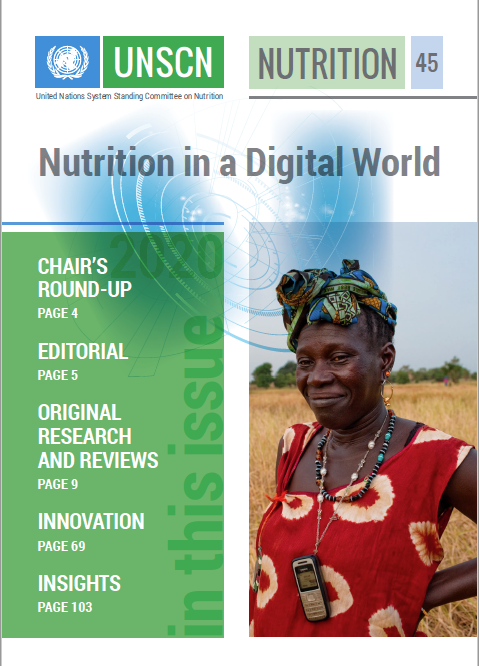9 July 2020. This year, the 45th edition of UNSCN Nutrition, examines the complexity of the digital world for improved nutrition: Nutrition in a Digital World (148 pages)
The theme of UNSCN Nutrition 45 – Nutrition in a Digital World was choosen before COVID-19. Digitalization has been playing a key role ever since, enabling vital parts of the world economy to continue functioning, allowing us to remain connected and giving us access to numerous public services, including those directly related to the pandemic. Another wake-up call on the need to enhance our knowledge and further the debate on the potential benefits and adverse impacts of innovative digital technologies in helping to achieve sustainable healthy diets and progressively realize the right to adequate food.
Digital technology, in and of itself, cannot fix the world’s food and nutrition problems, nor mend its dysfunctional food systems. However, once improving nutrition is deemed a priority, digital technologies are important tools. The potential of digital technologies to improve nutrition is phenomenal, but so are the risks that these technologies might entail.
"Digital channels facilitate greater, faster and cheaper audience
reach, but widely shared misinformation and disinformation
on food and nutrition over the internet is a major concern
– and particularly worrying when targeted at children and
young people." (page 8)
"Young people are especially vulnerable to the interactive nature of the advertising and marketing of energy-dense and nutrient-poor HFSS food and beverage products promoted through digital media platforms." (page 11)Most of the articles in UNSCN Nutrition 45 consider the potential-risk duality in a range of food-system perspectives– from food production, transformation and distribution to digital food marketing and retail; from behavioural change and capacity-building, including through social media, to the generation, processing and use of data; and from the protection of vulnerable groups to issues of inequality and human rights.
The theme of UNSCN Nutrition 45 – Nutrition in a Digital World was choosen before COVID-19. Digitalization has been playing a key role ever since, enabling vital parts of the world economy to continue functioning, allowing us to remain connected and giving us access to numerous public services, including those directly related to the pandemic. Another wake-up call on the need to enhance our knowledge and further the debate on the potential benefits and adverse impacts of innovative digital technologies in helping to achieve sustainable healthy diets and progressively realize the right to adequate food.
"Digitalization creates the potential for the application of digital technologies to all steps in the food supply chain. This presents great opportunities for SMEs in the agrifood sector to enhance their overall capacity, leading to the supply of better-quality diets for consumers." (page 59)
Case studies:
The mNutrition initiative was launched in September 2013. This 8-country initiative aims to improve the health of at least 0.5 million people by 2016, rising to 1 million by 2018.- Ghana: mHealth Country Feasibility Report: Ghana
mNutrition was implemented through an mAgri platform called Vodafone Farmers Club (VFC). This service offered an innovative combination of customized agriculture and nutrition information through SMS, by sharing local weather updates and market prices, recorded voice messages with agricultural and nutrition tips, an expert call centre to answer farming- and nutrition-related queries, discounted tariffs and free calls and text messages to other VFC members. - Malawi: mHealth Country Feasibility Report: Malawi
- Mozambique: mHealth Country Feasibility Report: Mozambique
- Nigeria: mHealth Country Feasibility Report: Nigeria + Catalysing mHealth Services for Scale and Sustainability in Nigeria
- Rwanda
- Uganda
- Zambia: mHealth Country Feasibility Report: Zambia
- Tanzania: mHealth Country Feasibility Report: Tanzania
In Tanzania mNutrition was implemented through the Healthy Pregnancy, Healthy Baby SMS programme, also known as the WazaziNipendeni SMS programme.
- The programme was run by the mHealth public–private partnership initiated in 2012 by Tanzania’s Ministry of Health and Social Welfare.
- The service offered customized health and nutrition information by text message to pregnant women, mothers with newborns and male supporters to promote good health-seeking behaviour and improve knowledge and practices around optimal childcare and nutrition.
- Wazazi Nipendeni was not a standalone intervention, but informed by government policy, actively promoting the use of government services for additional support (for example, regular antenatal care visits during pregnancy and child growth monitoring).
- The Use of Mobile to Drive Improved Nutrition Outcomes: Successes and Best Practices from the mHealth Industry
- mHealth Regulation Impact Assessment: Africa
- The Importance of Partnerships in mHealth
- Mobile SIM-based Medical Applications
The Public Health Nutrition research group and technology
experts at New York University have partnered to develop a
prototype app, Food2Share, which connects food-insecure
individuals with food establishments. Food salvaging is
a strategy to recover food that would otherwise go to
waste from restaurants, supermarkets and other food
establishments and redistribute it to local food programmes
and communities.
The fully designed Food2Share app will be adaptable to
numerous countries and regions and offer language options
and culturally appropriate food choices. NYU will provide
technological instructions and training for institutions and
countries, so that it can be used on a large scale.




No comments:
Post a Comment